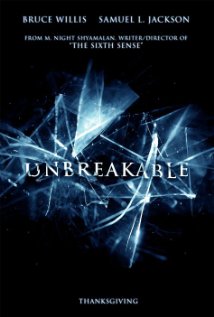
UNBREAKABLE.
US, 2000, 106 minutes, Colour.
Bruce Willis, Samuel L. Jackson, Robin Wright, Spencer Treat Clark, Charlayne Woodard, Michael Kelly.
Directed by M.Night Shyamalan.
If ever there was an unlikely name for a film, let alone a box-office hit, it is 'Unbreakable'. However, such was the faith of the producers in the talented writer-director, M Night Shyamalan, after his unexpected success with The Sixth Sense, that they immediately began production on this thriller, title and all. (In Italy, the film is called Il Predestinato, The Predestined One, which gives it a more ominous and significant tone.)
Bruce Willis plays David, an ordinary citizen, a security guard at a Philadelphia football stadium. He has a wife and son from whom he feels increasingly estranged. In fact, he is returning from New York by train after a search of another job, flirts with a sports agent on the train... But the train crashes. Not only does he survive, but not a bone of his body is broken.
The prologue to the film gives statistics about the popularity of comics in the United States, the number of comics sold per day and per year, so we are pondering the significance of comics as the film opens.
We have also been introduced to a strange character, Elijah, highly breakable, whose arms and legs were broken at birth. Elijah (played by Samuel L. Jackson with great dignity and solemn diction but with an impossible frizzy hair style). It emerges that he is an expert on comics and comic heroes, giving a portentous speech about how all peoples have communicated their myths in drawings (like the Egyptian hieroglyphs) and that some comics are the repositories of popular wisdom concerning the struggle between good and evil. They are illustrations of deep myths.
This means that while the style of the filming is 'realistic', the plot strains belief unless the audience goes along with the basic notion that Bruce Willis is playing a superhuman hero, a comic-strip hero, who has been unwilling to acknowledge his powers, that he is unbreakable, and that he must now accept his vocation and his special giftedness to combat evil. In going along with this supposition rather than being overcritical of its credibility, the audience can get caught up in the sometimes creepy situations, the bewilderment of the hero, his remembering accidents and how he escaped injury and his attempts to love his wife and son again.
The audience can also be sympathetic to Elijah, the broken man in his wheel chair who understands David so well and pursues the hero to accept and fulfil his powerful destiny.
Unreakable is, in its distinctive way, as atmospheric as The Sixth Sense, although its focus is on Bruce Willis rather than on the young boy, something which made the earlier film so appealing and frightening. I thought that Shyamalan would not give the plot a twist this time because audiences would be expecting it. But he does - and, once again, I did not pick it.
By the way M. Night Shayamalan is from an Indian family in Philadelphia. He is now just over 30, a lifetime of movies ahead of him and, if you wonder what he looks like, he does a 'Hitchcock-cameo' in his film as the drug-dealer that Bruce Willis challenges at the football grounds.
Eerie and offbeat thriller offering something to think about.
1. The work of the director, the world of his films, eerie? Fans for his films, those against?
2. The Philadelphia settings, the train, the homes, hospitals, the arenas, galleries? The feel of the city? The musical score?
3. The title, David as unbreakable, Elijah as breakable? The two extremes? Elijah and his using David?
4. The prologue: Elijah, his birth, the reaction of the doctor, that the baby had been dropped, limbs broken, the reaction of his mother? The boy young, kids bullying him, the gift of the comic, the theme of heroes and villains? The adult Elijah, comics, art? The client buying for his little boy, Elijah’s refusal? Elijah’s obsessions?
5. Bruce Willis as David, in the train, flirting, the crash, his being the sole survivor, in the hospital, walking out? Audrey to meet him? Joseph? The fragility of the marriage? His wanting to move to New York, applying for the job, not getting it? Audrey’s response, Joseph trying to deal with the situation?
6. David and his past, checking about his sick days or not, the accident in the swimming pool, phobia about water, the car crash and his giving up football? Falsifying the results to give up the sport for Audrey’s love? The differences in his life, apart? His job insecurity, locker room, the bosses, uniform, co-workers? On-the-job and surveillance?
7. Elijah seeking him out, his theory of opposites, accompanying David, with the queue, the man with the weapons? David’s power, insights? Elijah following him? The effect on David, wanting to break off?
8. Joseph, listening to Elijah, the bond with his father, going to the games? The behaviour at home, wanting to test that his father was unbreakable, the threat with the gun, David’s reaction, Audrey’s reaction?
9. The exhibition, the comics, Elijah’s theory about heroes and villains? His holding Elijah’s hand? The power to see crimes? The visions, the janitor, the abduction, David and the confrontation, the janitor’s death? David and his fears? In the water?
10. Holding Elijah’s hand, meeting Elijah’s mother talking with her? His foreseeing crimes that Elijah was orchestrating, reproducing the train crash, the importance of the train crash for Elijah to meet David?
11. The reconciliation, the marriage, Audrey and her work, healing, the encounter with the Elijah and his broken bones, her understanding the situation?
12. The final information that David had reported Elijah and that he was in a mental institution?